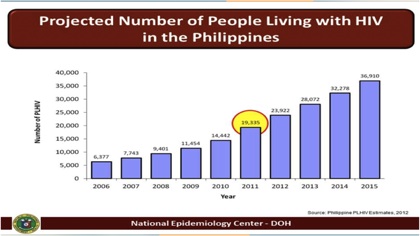SUMMARY
This is AI generated summarization, which may have errors. For context, always refer to the full article.
MANILA, Philippines – Rappler hosted a Google Hangout on its homepage on Wednesday, October 31, entitled “#HIVTalk: Take the Test.”
Guests included Jericho Paterno of Pinoy Plus, a care and support group for People Living with HIV (PLHIV). Paterno, a former migrant worker, has been living with HIV for the last 9 years.
Also on the Google Hangout, was Ryan Pinili, president of Take the Test, a volunteer group that offers pre- and post-counseling (as mandated by the law), as well as free HIV testing.
In case you missed this Google Hangout, you can watch the episode in full here:
Rising incidence of HIV
Since 2007, the Department of Health National Epidemiology Center (DOH-NEC) has recorded an exponential rise in HIV reported cases.
In 2007, from 317 recorded HIV cases, the number grew to 2,349 in 2011.
Since the first case of HIV in the Philippines was discovered in 1984, there have been 10,514 recorded cases in the country.
The DOH-NEC actually estimates this number to be higher at 19,335.

During the 12th Annual Philippine National Convention on AIDS held last week, Dr Eric Tayag, head of the DOH-NEC attributed the discrepancy to “those who have not yet been tested and do not know their status and those who have died without knowing that they were positive.”
The growth of HIV has been noted mostly among injecting drug users and men who have sex with men (MSM) between the ages of 15-24.
According to Pinili, the proliferation of social media networks and online dating sites have made casual sexual encounters extremely accessible among the MSM community.
“You meet online, then you meet in person with an understanding that it will be a casual sexual encounter. Sometimes, names are not even exchanged,” said Pinili.
This, compounded by low condom use, is contributing to the rise of HIV infection.
According to the National Demographic Health Survey of 2008, condom use in the Philippines stands at a low 2.8%.
Not getting tested
Pinili explained that there is a symptomatic stage where one does not exhibit any symptoms.
Paterno, for example, had to undergo HIV testing in the Middle East as part of his employment requirements. Prior to the testing, Paterno did not exhibit any symptoms and had no inclination that he was HIV positive.
However, while HIV testing is mandatory in certain countries, it is strictly voluntary in the Philippines.
Both Paterno and Pinili talked about the rights enshrined in RA 8504, The AIDS Prevention and Control Act which stipulates that:
- Each person has a right to anonymous and confidential HIV anti-body testing.
- A person who undergoes HIV anti-body testing should undergo pre- and post-counseling. The purpose of pre-testing is to get an account of sexual history and assess potential risky behavior. On the other hand, the purpose of post-testing is two-fold. In the case of a negative result, the counselor will remind and reinforce safe sex behavior such as condom use, mutual monogamy, among others. The counselor’s goal is to keep the person negative. On the other hand, in the case of a positive result, the counselor will refer the person to care and support groups, as well as run through treatment options.
- A person living with HIV cannot be discriminated against on the condition of his status.
(Read more about the RA 8504, The Philippine AIDS Prevention and Control Act of 1998.)
Stigma and discrimination
Despite the many advancements in HIV and AIDS research in the more than two decades when the virus was first discovered, stigma and discrimination still exist.
“There is also such a thing as self-stigma,” explained Paterno describing the shame and isolation that someone diagnosed with HIV may impose on himself because he thinks that his life will no longer be normal or productive.
“Sa culture pa naman natin, hindi pinag-uusapan ang sex,” added Paterno. (In our culture, we do not talk about sex.)
Pinoy Plus and Take the Test offer a safe and secure haven for information and education on HIV. Take the Test also offers free and anonymous HIV anti-body testing. For free HIV counseling and anti-body testing, call Take the Test: 0917-58-HIV-RT; 0999-88-448-78; 0932-8844878.
For information about HIV care and support, call Pinoy Plus: 0917-4756852.
If you’d like to host a sexual health workshop for your office or school organization, please call Sex and Sensibilities at 0917-8207277 (SAS) – Rappler.com
Add a comment
How does this make you feel?
There are no comments yet. Add your comment to start the conversation.